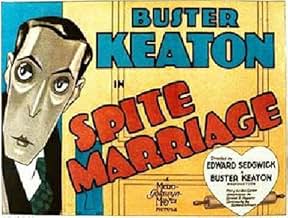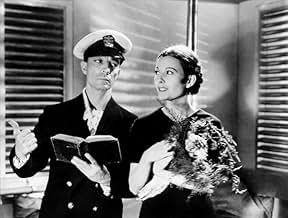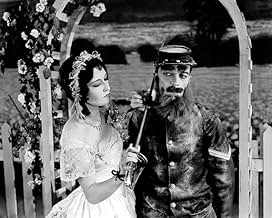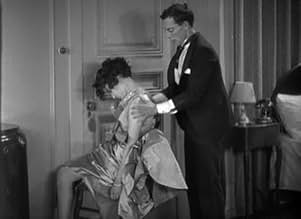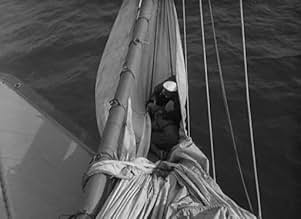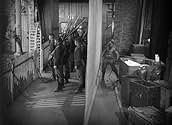Aggiungi una trama nella tua linguaAn unimpressive but well intending man is given the chance to marry a popular actress, of whom he has been a hopeless fan. But what he doesn't realize is that he is being used to make the ac... Leggi tuttoAn unimpressive but well intending man is given the chance to marry a popular actress, of whom he has been a hopeless fan. But what he doesn't realize is that he is being used to make the actress' old flame jealous.An unimpressive but well intending man is given the chance to marry a popular actress, of whom he has been a hopeless fan. But what he doesn't realize is that he is being used to make the actress' old flame jealous.
- Regia
- Sceneggiatura
- Star
- Giovanni Scarzi
- (as John Byron)
- Rumrunner
- (non citato nei titoli originali)
- The Bellboy
- (non citato nei titoli originali)
- Man in Ship's Engine Room
- (non citato nei titoli originali)
- Tugboat Captain
- (non citato nei titoli originali)
- Man in Audience Next to Elmer
- (non citato nei titoli originali)
- Actor as 'Union Officer'
- (non citato nei titoli originali)
- Stage Manager
- (non citato nei titoli originali)
- Tough Sailor
- (non citato nei titoli originali)
Recensioni in evidenza
Fortunately, while this IS an MGM-produced film, it is much better than most. The difference between the quality of this film and his next (FREE AND EASY) is dramatic--mostly because by the time FREE AND EASY came along, Keaton was only an actor and had no say in the creative process. This was insane, but the butt-heads at MGM wanted it this way. This was akin to hiring Picasso but only letting him do clown paintings!! SPITE MARRIAGE consists of three distinct sections and each are quite different in quality. The first consists of Keaton slavishly longing for a stage actress who has no idea that he even exists. While parts of this are very funny, the film oddly relies way too much on pathos compared to Keaton's other works--this was more Chaplin's style but now MGM was pushing Keaton this direction. I'd say this part of the movie would merit a score of 7. The second consists of when Keaton dates and then marries this selfish actress. The film grinds to a comedic halt and the highlight, so to speak, is when he spends what seems like an eternity to stick his drunk wife in bed. This was tedious and terribly unfunny--earning a score of 3. The final segment of the film was when Keaton oddly went out to sea. How this all was arranged was very silly and contrived, but once he was there the film finally showed the earlier Keaton magic--with amazing stunts like you'd expect in a Keaton film. How much of this was actually Keaton is debatable, as MGM was worried he'd get killed doing these dangerous stunts--even though Keaton was a master at this (as seen in STEAMBOAT BILL JUNIOR). Because the film's timing and laughs were impeccable, I'd give the final portion a score of 10--thus ending the movie on a very high note. Overall, averaging it all together, the film earns a 7.
Had Keaton continued to make movies of the quality of SPITE MARRIAGE, his career at MGM would have no-doubt flourished for many years, as the film comes very close to earning a score of 8 and is very watchable.
With all of that said, 'Spite Marriage' has a 34-year-old Buster Keaton still in his prime, and some pretty clever scenes. He gets enlisted into a stage play in the first part, and after botching up his make-up while another actor puts his on professionally, proceeds to foul up the production in various funny ways. As he tries to elude those chasing him afterwards, he does a rapid change into a top hat and tails that is both entertaining and shows off his muscular body. Later in the film, he does some impressive stuntwork on a yacht, at one point getting thrown off, and then as the yacht goes by quickly, catches a small boat trailing behind and hauls himself into it. Throughout the movie, he's lovable and a joy to watch. This was Keaton's last silent picture, and as the 1930's would not be kind to him, it marks a transition for him. If you can avoid comparing it to his masterpieces (which I know is tough!), you'll probably find it's well worth watching.
The original score is fantastic, here - it includes a great deal of popular music and makes commentary on the situations, but the meaning will be lost on most modern viewers (I collect records from that period, so I recognize most all of it); even so, it moves the action right along and gives us a rare chance to experience a silent film just as it was presented to contemporary audiences. No cheesy piano accompaniment, here! The sound effects are well done, and used sparingly.
The shipboard scenes could have been trimmed a bit; they seem to drag. Otherwise, time flies during this movie - you won't regret watching it! Just compare it with the average sound 'comedy' which Hollywood produced until 1932 or so, and you'll realize how they lost the art of making good films for a while. It's a crime that Keaton wasn't given the chance to produce his own talkies, because he might have changed the whole concept of what made a good SOUND comedy! It's a wonder that audiences didn't rebel against the boring, static, yawnful talk-fests that early sound comedies became; maybe the novelty of Talkies really WAS enough to bring them into the theaters.
I'd haven given this a 10, except for the draggy ship scenes - but the ending is satisfyingly Keatonesque!
Elmer Gantry (Keaton) runs a laundry, which allows him plenty of time and access to fine clothes for stalking in the guise of a rich suitor stage star Trilby Drew (Dorothy Sebastian). Trilby attaches herself to fellow star player Lionel Benmore (Edward Earle), but when Benmore takes up with a society beauty, Trilby decides to marry Elmer to show him up, to her later regret.
"Spite Marriage" is Keaton's last silent comedy (except for a short called "The Railrodder" he made near the end of his career). It's better than several of the features he made before being picked up by MGM the year before, specifically "College," "Go West," "Three Ages," and "The Saphead." But it falls short of classic Buster, often because of the role played by Buster himself.
For almost all of the first 30 minutes, viewers have to adjust to the novel notion of Buster the idiot. After an abrupt opening, we see Buster fumbling around on horseback, wiggling lovelorn in his seat as Trilby performs on stage, and finally sneaking on stage to make a mess of the show. It is funny, but in a frustrating, jerky way.
Too often the film calls attention to Buster's fish-out-of-water character, particularly when he joins the cast and stumbles over assorted props, to the annoying amusement of the audience. In his earlier films, Buster was a stoic victim of mayhem, rather than producing it himself. This made the comedy work without lessening the character. Here, you can't help but emphasize with the theatrical agent who moans: "Shoot him! They'll think it's part of the act!"
There are also odd bits of sympathy trolling. We see him bring her a stuffed dog doll with a tear running down one eye. After he discovers Trilby has left him, the camera lingers on the doll one last time, as an overt nod to Elmer's pitiful state. It's like something out of Harry Langdon.
But there are compensations throughout the early part. Trilby's play, "Carolina," is a wonderful send-up of theatrical conventions. When Lionel makes his entrance as a wounded fugitive, he stops to acknowledge the applause. "A scratch is nothing to a Southern gentleman," he tells Trilby's character, a goofy line that gets a nifty callback late in the film.
Sebastian is a big part of why "Spite Marriage" works as well as it does. For the first time, I watched a Keaton feature not pining for Sybil Seely. Trilby is no gentle flower, but rather a scheming, petty character who uses Elmer's affection for her own ends. As an ex-spite boyfriend, I could relate to this. Most important, she is very funny, especially in a scene in a speakeasy where she gets drunk and loses her cool when she sees Lionel with his new babe. It's a great use of Buster's expressionless manner by director Edward Sedgwick and the MGM team, playing it off Sebastian's scowling and histrionics. She also takes a fall as well as Buster, which helps.
The movie's most famous scene uses her athleticism to splendid effect, where he tries to put his unconscious bride to bed. He tries to sit her on a chair, only to have her roll off. As other reviewers here note, it's easy to ignore the effort she must put forth, keeping Buster hopping without apparently moving a muscle.
The finale, aboard a yacht, is the film's best sequence. Ironically, as historians John Bengtson and Jeffrey Vance note in their helpful DVD commentary, this was one part of the movie Buster didn't want to do, probably concerned he was repeating "The Navigator." But "Spite Marriage" takes the same idea in different directions, and most importantly, ramps up the laughter while giving us Buster in take-charge form. A key bit of business involves his wearing a captain's hat, which seems to signal a sense of newfound authority for the performer.
Alas, it was not to be. Buster's subsequent work for MGM, while quite profitable, would run the gamut from weak to awful, with Buster himself anything but in charge. "Spite Marriage," with its misplaced emphasis on poor, stupid Elmer, would inaugurate this trend, but it's more of a piece with his days as silent comedy's master clown. Keep this in mind, and you will have a good time.
The premise of the "Spite Marriage" is rather flimsy at best, and in other hands it probably would not have been even this good. It actually starts out pretty well, as the first part moves at a good pace, and includes a very good sequence with Buster's hapless character trying to take part in a play. It begins to peter out in the middle, though, as the premise begins to wear thin. For some reason, the bedroom sequence from this portion seems to be the best-remembered portion of the movie, but it really isn't one of the better parts of the film at all. But things pick up again in the last part, when the story takes a couple of unexpected turns, and the comedy also improves.
To be sure, it is a shame that Keaton was forced into the studio mold in pictures like this. It worked for many, but not for a unique talent like Buster. Still, at least this time the result is a generally entertaining movie with more than enough laughs to make it worth watching for anyone who enjoys silent comedies.
Lo sapevi?
- QuizBuster Keaton wanted this film to be a full talkie, but MGM released it with only a musical score and sound effects. One thing that prevented this picture from being a full talkie was that MGM was late to the sound game and had only one full set of recording equipment at the time. Its Loew's Theater chain also was not yet fully equipped to show sound pictures. Plus, MGM's head of production reasoned Keaton's films were made with a lot of time-consuming improvisations and didn't think the added expense of using valuable, scarce sound equipment was worth it.
- BlooperIn the dressing-room, while attempting to trim the hair for his false beard, Elmer accidentally severs the left-hand shoulder strap of his tank-top undershirt and has no time to repair it. When he hurriedly changes back into his smart clothes after the performance, both straps are still whole.
- Citazioni
Trilby Drew: What's that blonde hanging around you for?
Lionel Benmore: Can I help it if I'm good-looking?
- Curiosità sui creditiRather than appear at the beginning, the MGM roaring lion opening appears after the conclusion of the film, but just before "The End" title, which immediately follows it.
- ConnessioniFeatured in Arena: Cinema: Christmas Special (1976)
- Colonne sonoreI'd Rather Be Blue Over You
(uncredited)
Music by Fred Fisher
Lyrics by Billy Rose
Played as background music at the cafe
I più visti
- How long is Spite Marriage?Powered by Alexa
Dettagli
- Data di uscita
- Paese di origine
- Lingue
- Celebre anche come
- Spite Marriage
- Luoghi delle riprese
- Hotel Carmel - 201 Broadway St, Santa Monica, California, Stati Uniti(Lionel confronts Buster outside this hotel on the 2nd Street side - still in business in 2022)
- Azienda produttrice
- Vedi altri crediti dell’azienda su IMDbPro
- Tempo di esecuzione
- 1h 16min(76 min)
- Proporzioni
- 1.33 : 1

